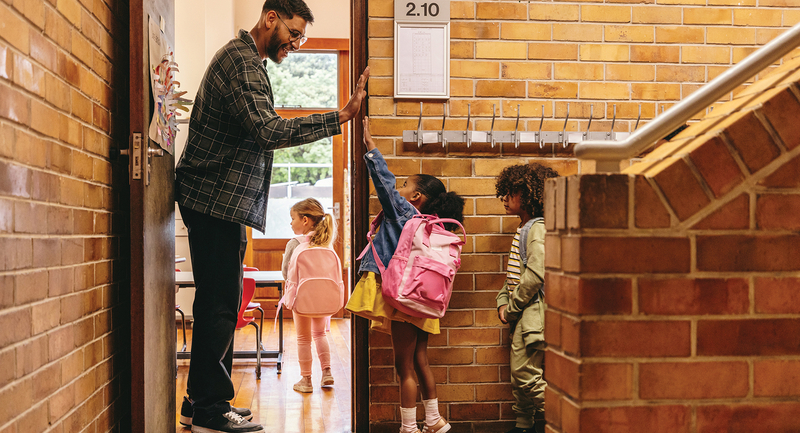Dear administrators, principals, teachers, and others who care about equity:
If you want all children to receive the best education possible, try to understand what it means to be a Black educator in a typical urban public school district, in a pandemic, in the wake of nationwide racial uprisings.
As research has confirmed the benefits of teacher diversity, many district and school leaders have increased efforts to recruit Black educators, while paying scant attention to their retainment and demonstrating outright indifference to what it takes to nurture their curiosity, mastery, and purpose. Leaders need to be mindful of what Black educators need, not just to maintain their mental health and well-being, but to become the high-caliber teacher-activists our students need them to be. Take this to heart: The best recruitment strategy is also a strong retention strategy.
I'm a veteran Black educator, a former teacher and principal of two urban schools. Here's how I see the realities Black educators face.
William Hayes, principal of Mastery High School in Camden, New Jersey, tutors middle school students.
Schools Aren't Safe Havens for Us
Educational institutions in this country have historically incubated systemic racism and social oppression. Black educators have not forgotten this. As we try to help children who share our race or ethnicity—and often our family backgrounds and childhood experiences—we step into school buildings that many times retrigger our own childhood traumas brought on by racism, inequities, poverty, and violence.
As Black educators, we see ourselves—along with real hope—in our students, but often we're forced to relive our own pain as our cries to change dehumanizing school policies fall on the deaf ears of administrators and policymakers. We're exhausted by microaggressions from "well-intentioned" people—including "nice white parents," frequently a force in public schools.
We're Burning Out Fast
This was true even before the current dual crisis. Black educators generally have more difficult working conditions, often in high-poverty, harder-to-staff schools (U.S. Department of Education, 2016). We often face social isolation from a lack of Black colleagues, a lack of trust and support from administrators and other faculty, and even an unfounded disrespect for our intellectual capabilities, subject-matter expertise, and classroom autonomy.
During this past summer's Freedom Schools Literacy Academy (operated by the Center for Black Educator Development, which I founded), a panel of Black teachers discussed these challenges with aspiring educators. Panelists shared how they teach students to speak up for themselves, yet when they step out of the classroom, they often feel silenced and excluded from decision making by the administration and other faculty. They explained the discipline it takes to root out their own unconscious biases and secure a healthy self-care regimen and self-care strategies, while maintaining their values based on their strong Black identities and commitment to Black pedagogy.
The pandemic has added to these stressors. Not only are Black Americans three times more likely than white ones to contract the coronavirus, and twice as likely to die of it (Michigan Public Health News Center, 2020), our families also bear the brunt of the economic fallout and threats to public education. The pandemic has ushered in renewed concerns about the "last in, first out" policy that often negatively impacts Black educators, and Black teachers are worried about students not having adequate digital resources. The emotional duress of coping with all this—while also dealing with the series of state-sponsored persecution of and injustices against Black Americans—produces a toxic stew that can poison the morale of the strongest Black educator.
Gerald Dessus teaches a social justice course at Mastery Charter Shoemaker Campus in Philadelphia. Photos courtesy of the Mighty Engine / Rashiid Coleman.
We're Well-Positioned to Help Students Harmed by Racism
With the right support, Black educators can connect with hard-to-reach students and those hurt by sustained traumatic stress brought on by institutionalized injustices and inequities. We sat in those seats, walked in those halls, and witnessed (if we didn't fall victim to) the bigotry of underexpectations and overpenalization in schools. We "get" our students, where they come from, what's happened to them, what they dream of. We know what it's like to have racism haunt our everyday existence and shape our identities. With these experiences and insights, we can help students resist systemic racial trauma and reimagine what it means to be Black in U.S. schools and in this country. We can practice what I was taught by my Black teachers: to lift as we climb.
Research shows that when Black students have one Black teacher by 3rd grade, they're 13 percent more likely to enroll in college. With two Black teachers, that jumps to 32 percent. For Black boys from low-income households, their on-time high school graduation rate soars by 40 percent if they've had a Black educator (Gershenson et al., 2018). Yet in school year 2017–2018, only seven percent of all public school educators nationwide were Black (NCES, 2018). This matters because a lack of Black educators perpetuates student achievement gaps.
But awareness of our potential life-saving impact comes with a burden under current school conditions. We feel we cannot let our students down. All good educators feel this way, but Black educators know they're often the first (and possibly the only) educator many Black and brown kids will have who looks like them and can understand what's happening to them. The likelihood that most Black students will go through 13 years of public school education without being taught by a Black educator weighs heavily on us. We feel the pressure to maximize the precious time we have with our students. To set them straight. To strengthen their resolve. We know that the toll of racist ideologies, institutionalized injustices, and social inequities on students can be traumatic, irreversible, and fatal.
Black educators are also aware that too many white teachers continue to set lower expectations for Black and brown children. Low expectations are a major reason why, for instance, less than half of all Black boys in Philadelphia graduate high school on time, and 87 percent of those who do graduate from high school don't attain any postsecondary training (Fogg & Harrington, 2015). This isn't because they aren't capable. Racist systems and mindsets are at work.
This winnowing down of Black male high school graduates perpetuates the current shortage of Black male educators, which in turn perpetuates the vicious cycle that holds back Black youth from achieving and contributing at the levels we need them to. It's a systemic problem brought on by inadequate recruitment and support to retain Black educators.
We Know Disappointment—and Hope
Black educators feel deep disappointment over landmark civil rights laws that haven't fulfilled their promises. Today, the color of our skin and our zip codes are still social determinants of our collective academic, economic, and social destinies. Districts responsible for educating majority Black and brown students receive $23 billion less in funding annually than whiter districts (EdBuild, 2019). But we share guarded hope that this year's racial reckoning may lead to real change.
That doesn't mean we face less pressure. The unprecedented challenges and possibilities for improving things put more pressure on Black educators to be changemakers and mentors in systems that still seem to be working against them. To thrive in these times, these educators need more intentional support, including mental health support.
Here's How to Support Us
Here are ways schools and school leaders can nurture Black educators' mental health:
Assess how well your school climate promotes the mental health of Black educators. Tools from the National Center on Safe Supportive Learning Environments' School Climate Measurement can help you get started.
Address issues of race, class, and privilege openly in the values you set and the way you communicate with and relate to everyone in your school community. Schools don't need to be perfect in this regard, but school leaders should acknowledge their own biases and the reality of systemic racism.
Be strategic about making your school community safe for everyone. Safety isn't the same thing as comfort; uncomfortable conversations will need to happen. Without confronting bias, it's nearly impossible to build even supportive, let alone antiracist, faculties. While adults do need safe spaces, adults also need to engage in creating brave spaces to do the work of ensuring Black and brown students are safe—emotionally, physically, intellectually, and culturally.
Respond to the onslaught on Black educators' mental health. The COVID-19 pandemic and racism endemic are eroding Black teachers' mental well-being. I challenge school communities to develop processes to connect Black educators with quality, affordable mental health therapy. Look to groups like the Black Mental Health Alliance and National Black Muslim COVID Coalition to set up funds to help educators pay for therapy. It's possible to build a school culture that supports Black educators' mental health. When I led Mastery Charter School-Shoemaker Campus in Philadelphia, I put in practice a school culture that inculcated a "Black minds matter" mindset in everything we did. We created an environment defined by high expectations and increased autonomy for teachers. We ensured community and nurtured cooperation rather than running the school like a pressure cooker or running teachers ragged solving for racism. We built time for staff to interrogate their own mindsets, unearth their biases, and reflect on their practices. We invested in hiring well, with an antiracist lens.
One More Reality Check
Our education system isn't simply broken for Black educators and Black and brown children. Many aspects of the system are constructed to disadvantage us at every turn. At this point, it's not a matter of just aiming to "fix things" in schools. I believe that, as slavery needed to be abolished, not reformed, we need to liberate education. And to liberate education, we need healthy Black educators who see their own activism as central to fighting the educational injustices that have wronged so many of us, our children, and communities.
I'm hopeful that we may yet see a more just America, but hope alone is no assurance. For Black lives to matter, the national consciousness must also embrace the notion that Black minds matter. More than embracing the idea, we must do the hard work. Our destiny as a nation, dedicated to the proposition that all people are created equal, hangs in the balance.
A Letter to My Fellow Black Educators
We need to take care of ourselves now. Your minds matter. Many of us, especially male educators, don't believe we need therapy and self-care—but we need it more than others, given all we have to deal with. Unacknowledged trauma is a heavy burden.
Healing takes many forms, but successful self-care is always self-directed. And to intentionally pursue our own mental health and wellness, we must recognize our frailties as well as our resilience.
I learned the importance of seeking help when I was 21. After a pickup football game in Southwest Philadelphia went awry, a young man shot me three times, leaving me for dead. One bullet severed a major artery in my left thigh, cutting off blood flow to my leg. Gangrene started to set in. I endured 12 excruciating surgeries to save my leg. As painful as that recovery was, I have relatives and friends with worse, more pernicious memories of growing up, pain connected to systemic racism and severe inequities. But that shooting was traumatic. In years following, I endured arrests, assaults, and harassment by racist police officers, further harming my psyche.
Yet I didn't seek traditional forms of mental health therapy to deal with my trauma, and neither did many family members who faced similarly traumatic experiences. It's worth asking why we didn't. It's partly because of the internalized racist stigma perpetuated in the unfounded notion that Black people with mental health issues are somehow fake or inferior. And partly because the mental health community hasn't always engendered among Black Americans the trust that's key to talk-based therapy.
But I did seek help to heal. My family and I found alternative, culturally informed ways of healing. Had I not tapped into certain healing practices used by my community and fellow educators, and the self-directed care I discovered through engaging in activism, enjoying nature, reading, and praying, I might've been too hurt to eventually forge a life as an educator-activist.
I was raised to have a positive racial identity—but that didn't keep me from becoming a very angry young man; it actually fueled my anger against racist ideologies and institutionalized injustices. Eventually, I was able to channel my anger productively. I attended college on a scholarship, then became a teacher through an alternative certification program, and then a principal—first at Anna H. Shaw Middle School, then at Mastery Charter School-Shoemaker Campus, in Philadelphia. I founded the Center for Black Educator Development because I know the transformational power that developing more Black educators holds for Black and brown students and communities—but also because a career in education holds transformational power for Black educators themselves.
Black educators, we need you mentally healthy and heart strong to keep up the fight to liberate education!









